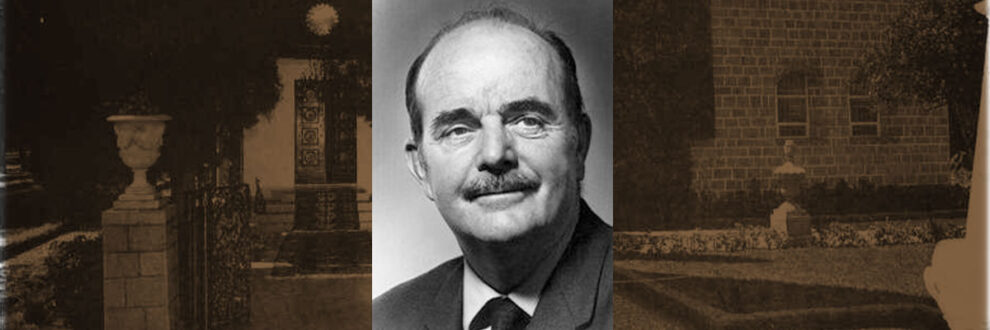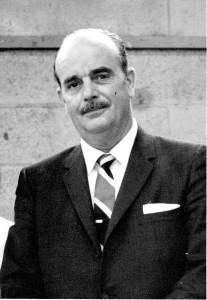
William Sears
Born: March 28, 1911
Death: March 25, 1992
Place of Birth: Duluth, Minnesota
Location of Death: Tucson, Arizona
Burial Location: East Lawn Palms Cemetery & Mortuary, Tucson, Arizona
William Bernard Patrick Michael Terence Sears VII was born to Irish Catholic parents. There, as a baby of 18 months, he had the first of a succession of dreams in which ‘Abdu’l-Baha appeared and counseled him. Not understanding the phenomenon, he could only refer to the vision as the ‘shiny man’. The shiny man, he said to his parents, called him Peter. He told him, ‘Fish like Peter.’ ‘I’m waiting for you,’ the shiny man told him on another occasion. ‘Search for me. Be like Peter. Fish.’
From his years Billy Sears possessed an inordinate interest in God. He asked his parents, his grandfather, the preacher, the mayor, even the local people he met a myriad of questions: ‘Did God have a wife? Where was His house? Could He speak Chippewa Indian…? Did He really love everybody?…Why did He make mosquitoes?
Williams’ grandfather became his spiritual mentor. Billy Sears talked to the old man about his concerns and dreams and found satisfying answers and loving encouragement. ‘Don’t you quit asking questions and searching for what’s in your heart,’ Grandfather would tell Billy, ‘or your dream will never come true.’ If you find the light,’ he told his grandson, ‘never stumble or let it go…’
With his grandfather’s encouragement, young Billy started to study the Bible. He was particularly attracted to scriptures that spoke of the Last Days such as the Son of man coming in the glory of the Father and the return of the Spirit of Truth.
As Billy Sears sat at the feet of his grandfather, he learned much about the ways of people. When hearts are turned towards material things of this world, the old man would say, they become dark. But when they’re turned to God and forget the things of the earth, they become bright and shiny inside. God, he said, doesn’t cause suffering people do that. The shepherds of the world are more interested in the wool than in the lambs. God knows what’s going to happen, but He doesn’t make it happen. Everyone is born with free will and a soul and chooses right and wrong. ‘If we were all a little busier trying to know what God wants instead of what we want, there wouldn’t be so much trouble down here,’ he told his grandson. ‘And if they spent a little more time thinking about the inside part that lasts forever and a little less about the outside part that rots, they’d be better off when they get born into the next world.’
When William grew up and went off to college, his grandfather counseled him again. ‘Nobody loves the William Sears that has a job and money and fine clothes. Nobody. Neither your mother nor father nor friends – not even your old grandfather. They love the qualities you possess. The kindness, the gentleness, the justice, the courage, the generosity – this is what they love. And as these things grown in you, their love for you becomes greater. And if you lose these qualities their love begins to wither and die. Anybody can be happy when everything is going fine, but it takes nobility to be happy when things are difficult.’
After attending the University of Wisconsin for one year, William Sears married and had two boys. His wife Kathleen was very ill following the birth of their second son, Michael. After several months in the hospital, she died. William poured his energies into his work. He pursued a career as playwright, sportscaster and television writer and director. He was so successful that he found himself being ‘pushed farther and farther away from my dream each day, and more and more into a world that cared very little about the things of the spirit.’ So caught up in the world of work was he that his grandfather sent him a telegram: ‘Look out! You may drop that torch.’
Then William met Marguerite Reimer and his life changed. He told her about his dream of the shiny man and she told him about ‘Abdu’l-Baha, who had been in Minnesota around the time of the dream.
Initially skeptical about the Bahá’í Faith, Bill perused The Dawn Breakers given him by Marguerite. But what finally stirred him was his discovery in The Promulgation of Universal Peace that ‘Abdu’l-Baha had given a talk in Minneapolis on September 20, 1912 – the very day and year of his first dream of the shiny man. ‘Abdu’l-Baha had spoken only a short distance from the town where Billy Sears had lived. In His talk He had warned people to investigate the truth for themselves and not to follow in the footsteps of those who blindly accept things.
Excited by this revelation, Bill nevertheless remained unconvinced. His relationship with Marguerite, however, blossomed. When he was offered a job in Salt Lake City, he proposed to her and she accepted.
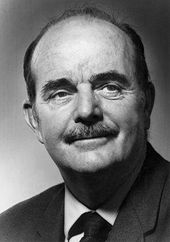 Meanwhile ‘Abdu’l-Baha wouldn’t leave Bill alone. On returning home from his honeymoon Bill dreamed again of the shiny man. In the dream, he was seated on a rock while the familiar figure came rushing by on a pair of skis, His white beard flowing in the breeze. Beckoning William to follow, they raced together down the hill, the winter rapidly retreating into spring-like warmth as they descended. Below, William could see a valley with a city nestled within. They shiny man pointed down and said to his companion, ‘This is the city.’ Then he vanished and Bill woke up.
Meanwhile ‘Abdu’l-Baha wouldn’t leave Bill alone. On returning home from his honeymoon Bill dreamed again of the shiny man. In the dream, he was seated on a rock while the familiar figure came rushing by on a pair of skis, His white beard flowing in the breeze. Beckoning William to follow, they raced together down the hill, the winter rapidly retreating into spring-like warmth as they descended. Below, William could see a valley with a city nestled within. They shiny man pointed down and said to his companion, ‘This is the city.’ Then he vanished and Bill woke up.
Bill and Marguerite and Bill’s two boys moved to Salt Lake City. Just before Christmas they took a drive through the mountains around the city. At Lookout Point above Salt Lake City, they stopped the car to view the scene below.
‘I stepped to the ledge,’ Bill later wrote, ‘and there lying below me was the magic city I had seen to clearly in my dream.’ He turned to Marguerite. ‘This is the city’, he said.
Back at home, Marguerite asked Bill many questions about his dreams and he described the shiny figure who came to him so often. After a while, Marguerite handed Bill a picture of a man. Bill saw the ‘white beard, soft as silk, the flowing white robes, the smile of eternal kindness; and was deeply moved.
‘This’, he said, ‘is the man.’
‘That’, Marguerite said, ‘is ‘Abdu’l-Baha’.
Immediately Bill began an investigation of the Bahá’í Faith, an investigation that was eventually published as Thief in the Night: The Case of The Missing Millenium. When he finished reading the Book of Proofs in September 1940 he told Marguerite, ‘I am a Bahá’í.’
Meanwhile William Sear’s professional star soared like a meteor. Before his marriage he had worked as radio announcer for a time at WOMT in Manitowoc, Wisconsin. Later he was with WHBL in Sheboygan, WKBB in Dubuque and then KUTA, KSL and KDYL in Salt Lake City. He was with KFBK in Sacramento, KPO in San Francisco, WPEN and WCAU in Philadelphia, and, finally, WCAU Television and CBS. He wrote a half-hour comedy drama with Paul Ritts called In the Park, starring a puppet, Albert the chipmunk, and Bill himself, playing an old man who could talk to animals. He was earning a huge salary and was extremely popular. But he gave it all up to pioneer to Africa.
The Sears family arrived in South Africa in 1953, at the outset of the Ten Year Crusade, in response to the Guardian’s appeal for pioneers, and began what William later described as the most exciting and happy years of their Bahá’í pioneering lives. Settling on a farm some 25 kilometers from Johannesburg, they raised peacocks and grew a wide variety of fruits and vegetables. From their ample harvest they prepared foods and baked cakes. Baking day invariably coincided with deepening classes, study classes and firesides, attracting people in droves from neighboring communities. According to Bill, Marguerite conducted a permanent open house at the farm.
Despite tick fever, broken ribs, a coronary, Asian flu, malaria and hepatitis and being nearly killed by cobras, William Sears loved the life in Africa. ‘Don’t let them find out in America what it’s like over here,’ fellow-pioneer Robert Quigley joked to him, ‘or the prospective pioneers will empty out all forty-eight states, and ruin everything. So important was pioneering to William that he devoted some 40 pages of his book All Flags Flying to it.
Bill’s creative talent was soon in evidence again. He launched the radio programme “That Man Sears’, which was so popular that it was heard from the Atlantic to the Indian Ocean, from Cape Town to Lourenco Marques in Mozambique. In 1954 he was appointed by Hand of the Cause Musa Banani to the Auxiliary Board and began travelling to every corner of Africa.
On the first day of April 1954 Bill Sears arrived in Haifa on pilgrimage. From the outset, his deepest longing was to meet the Guardian. Filled with trepidation, he felt both misgivings for his shortcomings and the yearnings of his devotion. Ugo Giachery had told him in Rome how he felt shivers down his spine every time he approached the door to the Pilgrim House dining room, like a little boy who had been caught with jam on his face. Bill recalled later that Mr. Giachery had not told him that it was such a cold shiver and that there was so much jam!
Bill had to wait a day before seeing the Guardian as Shoghi Effendi was at Bahji the first night. Finally the pilgrims gathered for dinner at the Pilgrim House. Bill felt himself revealed in all his unworthiness as Shoghi Effendi came towards him, held out his arms and embraced him. Bill felt that he had come home. He found his throat had stopped up and his eyes had misted over. Then he found himself seated directly opposite Shoghi Effendi at the dinner table.
Of that first night he later wrote:
I felt only a transcendent happiness. I watched the Guardian with rapt attention and ever increasing devotion. This was as close, in our day, as man could come to the direct source of the power of God, His Majesty, His Justice, His Mercy, His Love. I felt them all flowing from the Guardian.
When he asked me about my journey I answered him and my words shamed me. I had made my living by words, but could think of nothing to say in his presence. My words were feeble, clumsy and uncertain. It was as though a glib tongue had been made fearful that it might try to say something witty or clever. This Guardian could be impressed by only one thing, service to the Faith. Nothing could ever influence his judgement, not wealth, position, power or friendship…
One thing was apparent to me at once. My life was changing. My concept of the Faith, of teaching, of service. None of these would ever be the same again…
The Guardian calls you to a higher service, he lifts you up to heights of limitless joy, then sets you gently down. Having revealed the treasure, he requests the payment, which is service to the Faith of God.
Your only fear now is that you may fall short of the possibilities he had made you see in yourself.
Bill described the Guardian as short in stature, with dark hair greying at the sides, having a medium to dark complexion and dark eyes that became lighter and animated as though burning with some inner fire. Shoghi Effendi had small, slender, expressive hands. He was smooth shaven with a dark mustache. He had an energetic quality and was very sturdy.
In addition to this physical description, William Sears also provided a description of Shoghi Effendi’s energy:
You can feel the heat of his pace, you are shaken by the draft of his passing, you can see the light of his spirit. He is a giant comet that blazes across the sky, drawing into his orbit all the bits of matter that can feed the flame of his fire. All that can burn with this same fire are drawn in to increase the brightness. Those who are not attracted by this blazing ball of fire thunder past. They may try, too late, to enter but the moment of the junction is passed. The fiery tail of the comet sweeps by them and they are left in darkness.
This is the Guardian. I have emphasized this feeling of action most of all because it predominates the others. Action, then results. Not big projects planned, but small projects completed. He does not interest himself in what you’re going to do, but in what you have done.
As pioneer himself, Bill naturally remembered what Shoghi Effendi had to say about pioneering:
The Guardian said that the friends feel that it is difficult to leave their homes and pioneer, even to move to the goals inside their own countries. They do not see that he is not asking them to sacrifice. He is protecting them form themselves. He is protecting them not only from the calamity that is rushing toward them outwardly, but he is protecting them from the calamity that is rushing toward them inwardly.
The final moments before his parting from his beloved Guardian brought heartache to William:
The Guardian came around the head of the table to take my hands in parting. I clung to him, trying to drain courage from him. He said he would pray for the success of the work in South Africa. Then he embraced me! He kissed me upon the cheeks. I pressed him to my heart. He smiled lovingly to me. ‘I hope when you make your next pilgrimage,’ he said, ‘that you will bring some of your African children with you.’ The he was gone!
Bill’s great friend Robert Quigley and his wife, Keith, joined the Sears family in Africa. The Guardian had told Robert, ‘You and Bill make a good team; you should work together.’ As a result of these eleven words spoken on the side of God’s Holy Mountain, the two men, who shared a common profession, became inseparable. Together they travel taught in Africa; visited the grave of Lua Getsinger; co-authored The Flame; labored successfully to protect the Cause; won an accolade for the most outstanding religious programme in Milwaukee; made a master recording of the highlights of the first World Congress; attended summer schools together in Europe, South America and the United States; launched a radio series exposing the absurdity of prejudice in America called Mr Justice; and started a television programme in Hawaii called The New World. So close was their friendship that Keith was the first person Marguerite telephoned the day William Sears passed away. ‘Bill and Bob are now together for eternity,’ she said. ‘Ya’ Baha’u’l-Abha!’
In 1956 Bill was elected to the National Spiritual Assembly of South and West Africa and became its first chairman. Then in October 1957 he received the message from Shoghi Effendi that he had been appointed a Hand of the Cause of God.
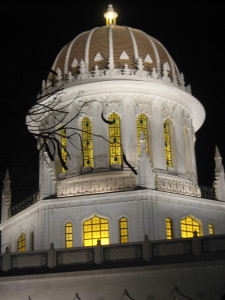 As a Hand of the Cause, William Sears travelled the equivalent of 20 times around the world. The list of places he visited would fill pages but included such far-flung destinations as Waikiki, African bush country, Uganda, Kenya, Tanzania, Zululand, Kyoto, Mombasa, Salisbury, Tilling, Canberra, Port Louis, San Jose, Liberia, Seshego, Ermelo, Addis Ababa, Sugarbrush, Lagos, Vallejo, Port au Prince, Dallas, Durban, Adrianople, Jakarta, India, Tokyo, Tihran, Walla Walla, Maputo, Mexicali, Annoto Bay, New Delhi, Anchorage, Khartoum, Cairo, West Berlin, Reunion Island, Buenos Aires, Beirut, Naples, Pearl Harbor, Brussels, Birmingham, Canton, Honduras, Australia, Cyprus and British Columbia. The list goes on. And on. And on…
As a Hand of the Cause, William Sears travelled the equivalent of 20 times around the world. The list of places he visited would fill pages but included such far-flung destinations as Waikiki, African bush country, Uganda, Kenya, Tanzania, Zululand, Kyoto, Mombasa, Salisbury, Tilling, Canberra, Port Louis, San Jose, Liberia, Seshego, Ermelo, Addis Ababa, Sugarbrush, Lagos, Vallejo, Port au Prince, Dallas, Durban, Adrianople, Jakarta, India, Tokyo, Tihran, Walla Walla, Maputo, Mexicali, Annoto Bay, New Delhi, Anchorage, Khartoum, Cairo, West Berlin, Reunion Island, Buenos Aires, Beirut, Naples, Pearl Harbor, Brussels, Birmingham, Canton, Honduras, Australia, Cyprus and British Columbia. The list goes on. And on. And on…
While travelling the world or at home, William Sears embodied ‘Abdu’l-Baha’s instructions to the Hands of the Cause:
The obligations of the Hands of the Cause of God are to diffuse the Divine Fragrances, to edify the souls of men, to promote learning, to improve the character of all men and to be, at all times and under all conditions, sanctified and detached from earthly things. They must manifest the fear of God by their conduct, their manners, their deeds and their words.
Well versed in the writings of the Faith, William spoke with clarity, force and love from the teachings while reminding the believers that his own words were ‘ashes’. His ability to quote from scripture often moved his audience and he inspired both young and old to strive to embody a more noble life style and to reach for a loftier standard of service to the Holy Threshold.
A brilliant natural educator, William was able to translate his own knowledge of the Faith into terms everyone could understand. He often used physical examples to demonstrate spiritual concepts. Once, for example, he set out different mirrors to reflect the sun, indicating how God is mirrored in His manifestations. Another time he turned a glass upside down before pouring water onto it, showing how earth bound people cannot receive the waters of Bahá’u’lláh’s teachings.
He wrote ten books, using a variety of writing techniques to make his points and address different audiences. Perhaps his best known is Thief in the Night, which has inspired thousands of readers around the world since its first publication in 1961. Demonstrating how the Bahá’í Faith fulfill biblical prophecy, Thief in the Night is one of the best-selling Bahá’í books of all time, having been reprinted more than 20 times in English and translated into twelve languages.
William Sears was a man of concentrated energy, intense devotion, great humor and prodigious accomplishments. His wife remarked that ‘Social events meant little or nothing to him except interruptions in his work. his one relaxation, but only with his favorite teams, was watching a few sports. he enjoyed football, baseball, basketball and golf – but only when he really could afford taking the time – and usually only at the end of a season for the final games.
William Sears longed to see the believers arise to their high calling. He launched many teaching campaigns around the world, emphasizing the greatness of the day, the urgency of the hour and his profound belief in the capacity of the Bahá’ís to fulfill any task they set themselves. He often quoted from the writings passages asserting humanity’s greatness and potential:
Say, verily any one follower of this Faith can, by the leave of God, prevail over all who dwell in heaven and earth…
He that summoneth men in My Name is, verily, of Me, and he will show forth that which is beyond the power of all that are on earth.
Mr. Sears urged the believers to rely on the assistance of the Supreme Concourse, a resource so under-used, he said, that the accumulation of power waiting to come to our aid was awesome. Asked how Bill drew on this power himself, Marguerite replied:
Firstly, earnest daily prayer. Not only morning and night – but frequently during the day. His complete reliance on the creative Word and his ‘pondering’ to get more and more answers from every Word. His work, whatever he was doing at the time, was always in the forefront of his mind. He carried a very small notebook always in case an idea came when [he was] away from his desk so he could write it down to transfer where needed later. His concentration was complete when he was working. Nothing else existed – there were no half-way measures. This was intensified when he became a Bahá’í. It was like an acetylene torch in its intensity – and as a result of this, I’m sure attracted help constantly form the Supreme Concourse.
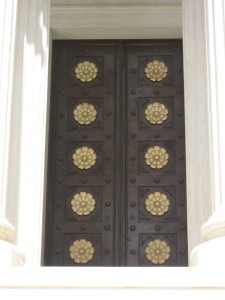 In the evening of his life, though he suffered from diabetes, failing eyesight, arthritis and general debility and had to be driven everywhere, carried or wheeled from car to meeting place and continually shielded by his wife from well-meaning offers of assistance by Bahá’ís and friends, and though he appeared exhausted before and after meetings, nevertheless he had an amazing ability to speak to the believers with the power of a much younger man and to stir the friends to greater heights. Such was the love of this indefatigable warrior whose body wore out but whose spirit shone with brilliance and power.
In the evening of his life, though he suffered from diabetes, failing eyesight, arthritis and general debility and had to be driven everywhere, carried or wheeled from car to meeting place and continually shielded by his wife from well-meaning offers of assistance by Bahá’ís and friends, and though he appeared exhausted before and after meetings, nevertheless he had an amazing ability to speak to the believers with the power of a much younger man and to stir the friends to greater heights. Such was the love of this indefatigable warrior whose body wore out but whose spirit shone with brilliance and power.
When his final moments on this earthly plane inevitably arrived, William Sears simply fell down, too exhausted to rise again, and his noble soul quietly abandoned its earthly temple.
On his passing on March 25, 1992, the Universal House of Justice cabled:
OUR HEARTS DEEPLY SADDENED, BAHA’I WORLD GREATLY DEPRIVED, BY PASSING HAND CAUSE GOD WILLIAM SEARS, VIBRANT, CONSECRATED, STOUT-HEARTED STANDARD-BEARER FAITH BAHA’U’LLAH. HIS MORE THAN HALF-CENTURY UNBROKEN SERVICE MARKED BY UNFLINCHING DEVOTION TO BELOVED GUARDIAN, INFECTIOUS ENTHUSIASM FOR TEACHING, GALVANIZING SENSE DRAMA, DISARMING HUMOUR, SPECIAL LOVE CHILDREN, UNFLAGGING DETERMINATION IN FACE DIFFICULTIES.
HE WILL EVER BE REMEMBERED FOR DEDICATING FULL RANGE HIS CREATIVE AND ENERGETIC CAPACITIES AS WRITER, EDITOR, LECTURER, RADIO AND TELEVISION PROGRAMME DIRECTOR, TO HIS VARIED SERVICES AS TRAVELING TEACHER TO NUMEROUS COUNTRIES, PARTICULARLY IN THE AMERICAS, AND AS PIONEER TO AFRICA WHERE HE WAS MEMBER OF AUXILLARY BOARD AND THE NATIONAL SPIRITUALLY ASSEMBLY SOUTH AND WEST AFRICA WHEN IN 1957 HE WAS ELEVATED RANK HAND CAUSE. HE LATER SERVED AS MEMBER BODY HANDS HOLY LAND.
HIS LOSS ACUTELY FELT IN NORTH AMERICA WHERE HE EXPENDED LAST MEASURE HIS EBBING STRENGTH PROMOTION TEACHING ACTIVITIES. DYNAMIC EFFECTS HIS WORK ENDURE THROUGH HIS MANY BOOKS AND RECORDINGS. GENERATIONS TO COME WILL REJOICE IN RICH LEGACY LEFT THEM THROUGH HIS HISTORIC ACCOMPLISHMENTS. FERVENTLY PRAYING HOLY SHRINES PROGRESS HIS ILLUSTRIOUS SOUL ABHA KINGDOM.
ADVISE FRIENDS THROUGHOUT WORLD COMMEMORATE HIS PASSING. REQUEST BEFITTING MEMORIAL SERVICES IN HIS HONOUR ALL HOUSES WORSHIP.
Source:
Harper, Barron. Lights of Fortitude. Oxford: George Ronald Publishers pp 496 – 506
Images:
David L. Smith
Baha’i World Centre Archives
(c) Baha’i Chronicles



